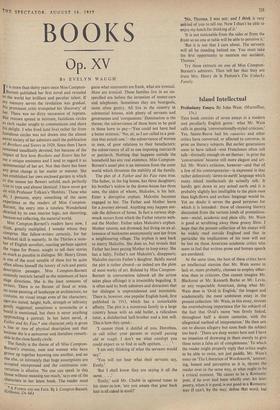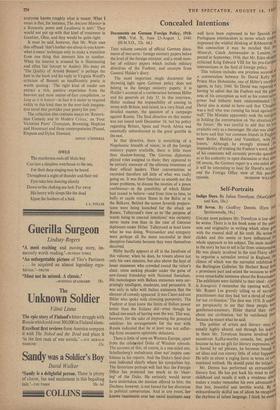Island Intellectual
THIS book consists of seven essays in a modern and peculiarly English genre : what Mr. Wain calls in passing 'conversationally-styled criticism.' Yes, Sainte-Beuve had his causeries and other critics have conversed, or affected to converse, in print on literary subjects. But earlier generations seem to have talked—and Frenchmen often still talk—formally enough on set themes : in print the 'conversation' became still more elegant and art- ful. Mr. Wain's criticism, however—and that of a few of his contemporaries—is expressed in that rather defensively 'down-to-earth' language which many island intellectuals do actually talk. It hardly gets down to any actual earth and it is probably slightly less intelligible to the plain man than high-flown and archaic language would be. Yet no doubt it serves the good purposes for which it is intended : those of cleansing literary discussion from the various kinds of pretentious- ness—social, academic and plain silly. Mr. Wain is good at scrubbing away these greasy films. I hope that the present collection of his essays will be widely read outside England and that in particular the implications of his tone will not be lost on those American academic critics who seem to feel that written prose and human speech are unrelated.
At the same time, the best of these critics have an intellectual stamina that Mr. Wain seems to lack or, more probably, chooses to employ other- wise than in criticism. One cannot imagine Mr. Blackmur or Mr. Kenneth Burke or Mr. Levin, or any respectable American, doing what Mr. Wain does in 'Ovid in English,' the longest and academically the most ambitious essay in the present collection. Mr. Wain, in this essay, stresses the overwhelming importance (for his subject) of the fact that Ovid's name 'was firmly linked, throughout half a dozen centuries, with the allegorical method of intepretation.' He then sets out to discuss allegory but soon finds the subject too hard : 'There are deep waters here and I have no intention of drowning in them merely to give these notes a false air of completeness.' To which the reader might properly reply that critics ought to be able to swim, not just paddle. Mr. Wain's essay on 'The Liberation of Wordsworth,' interest- ing, honest and perceptive as it is, throws the reader over in the same way, at what ought to be a critical moment. 'He ceases to be a Romantic poet, if he ever had been wholly one; his later poetry, when it is good, is not good in a Romantic way (I can't, by the way, define that word, but
everyone knows roughly what is meant. What I mean is that, for instance, The Ancient Mariner is a Romantic poem and Laodamia is not).' They would not put up with that kind of treatment in Gambier, Ohio, and they would be quite right.
It must be said, however, that Mr. Wain uses this offhand 'don't-bother-me-about-it-you-know- what-I-mean' technique only to make a transition from one thing that interests him to another. When his interest is aroused he is illuminating and often fair (except to Auden). His essay on 'The Quality of Arnold Bennett' is perhaps the best in the book and his reply to Virginia Woolf's criticism of Bennett as insufficiently poetic is worth quoting : 'The right kind of reader can extract a rich, positive experience from the heaviest and most matter-of-fact compilation, so long as it is honest—in fact it is easier to respond richly to this kind than to the over-lush imagina- tive novel that provides your poetry for you.'
The collection also contains essays on 'Restora- tion Comedy and its Modern Critics,' on 'Four Victorian Poets' (Tennyson, Browning, Hopkins and Housman) and three contemporaries (Pound, Empson and Dylan Thomas).
DONAT O'DONNELL































 Previous page
Previous page